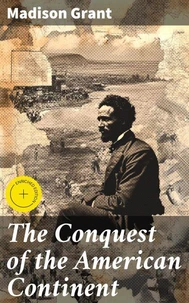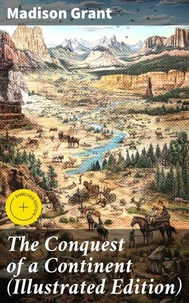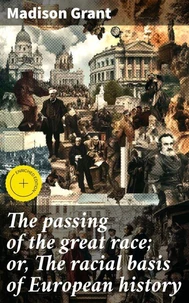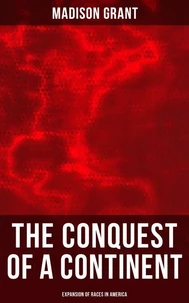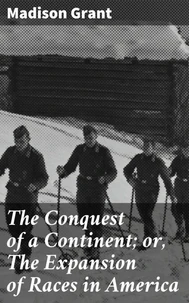The passing of the great race; or, The racial basis of European history
Par :Formats :
Disponible dans votre compte client Decitre ou Furet du Nord dès validation de votre commande. Le format ePub est :
- Compatible avec une lecture sur My Vivlio (smartphone, tablette, ordinateur)
- Compatible avec une lecture sur liseuses Vivlio
- Pour les liseuses autres que Vivlio, vous devez utiliser le logiciel Adobe Digital Edition. Non compatible avec la lecture sur les liseuses Kindle, Remarkable et Sony
 , qui est-ce ?
, qui est-ce ?Notre partenaire de plateforme de lecture numérique où vous retrouverez l'ensemble de vos ebooks gratuitement
Pour en savoir plus sur nos ebooks, consultez notre aide en ligne ici
- Nombre de pages356
- FormatePub
- ISBN859-65--4772452-0
- EAN8596547724520
- Date de parution17/11/2023
- Protection num.Digital Watermarking
- Taille2 Mo
- Infos supplémentairesepub
- ÉditeurDIGICAT
Résumé
In "The Passing of the Great Race; or, The Racial Basis of European History, " Madison Grant presents a provocative and often controversial exploration of racial theory and its implications for history and society. Published in 1916, the book blends polemical rhetoric with a pseudo-scientific approach, arguing for a hierarchy of races and the superiority of the Nordic race. Grant utilizes a mix of historical analysis and anthropological observations, situating his argument within the context of early 20th-century racial thought that emphasized eugenics and nationalism, reflecting the tense sociopolitical climate of post-World War I Europe.
Madison Grant, an American conservationist and prominent figure in the early eugenics movement, had deep interests in anthropology and race. His background as a New York socialite and member of various exclusive organizations, including the New York Zoological Society, informed his worldview, leading him to intertwine racial theories with environmental conservation. Grant's work helped to shape racist ideologies of the time, making a significant yet troubling mark on discussions of race and history.
This book is recommended for readers interested in the intersection of race, history, and social theory, providing critical insights into the origins of racial theories that would later have profound societal impacts. While controversial, Grant's work invites scrutiny and debate, making it essential reading for those examining the historical context of racial discourse.
Madison Grant, an American conservationist and prominent figure in the early eugenics movement, had deep interests in anthropology and race. His background as a New York socialite and member of various exclusive organizations, including the New York Zoological Society, informed his worldview, leading him to intertwine racial theories with environmental conservation. Grant's work helped to shape racist ideologies of the time, making a significant yet troubling mark on discussions of race and history.
This book is recommended for readers interested in the intersection of race, history, and social theory, providing critical insights into the origins of racial theories that would later have profound societal impacts. While controversial, Grant's work invites scrutiny and debate, making it essential reading for those examining the historical context of racial discourse.
In "The Passing of the Great Race; or, The Racial Basis of European History, " Madison Grant presents a provocative and often controversial exploration of racial theory and its implications for history and society. Published in 1916, the book blends polemical rhetoric with a pseudo-scientific approach, arguing for a hierarchy of races and the superiority of the Nordic race. Grant utilizes a mix of historical analysis and anthropological observations, situating his argument within the context of early 20th-century racial thought that emphasized eugenics and nationalism, reflecting the tense sociopolitical climate of post-World War I Europe.
Madison Grant, an American conservationist and prominent figure in the early eugenics movement, had deep interests in anthropology and race. His background as a New York socialite and member of various exclusive organizations, including the New York Zoological Society, informed his worldview, leading him to intertwine racial theories with environmental conservation. Grant's work helped to shape racist ideologies of the time, making a significant yet troubling mark on discussions of race and history.
This book is recommended for readers interested in the intersection of race, history, and social theory, providing critical insights into the origins of racial theories that would later have profound societal impacts. While controversial, Grant's work invites scrutiny and debate, making it essential reading for those examining the historical context of racial discourse.
Madison Grant, an American conservationist and prominent figure in the early eugenics movement, had deep interests in anthropology and race. His background as a New York socialite and member of various exclusive organizations, including the New York Zoological Society, informed his worldview, leading him to intertwine racial theories with environmental conservation. Grant's work helped to shape racist ideologies of the time, making a significant yet troubling mark on discussions of race and history.
This book is recommended for readers interested in the intersection of race, history, and social theory, providing critical insights into the origins of racial theories that would later have profound societal impacts. While controversial, Grant's work invites scrutiny and debate, making it essential reading for those examining the historical context of racial discourse.


